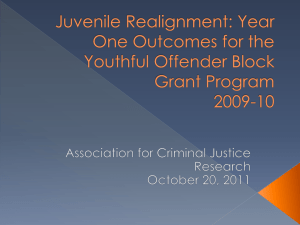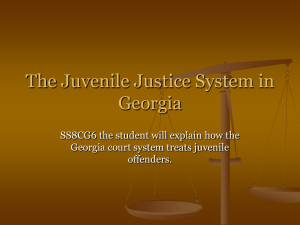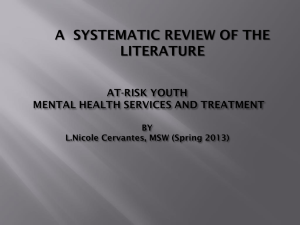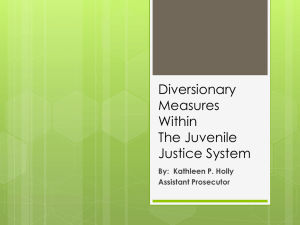"The Changing Expectations of Juvenile Justice in Texas"
advertisement
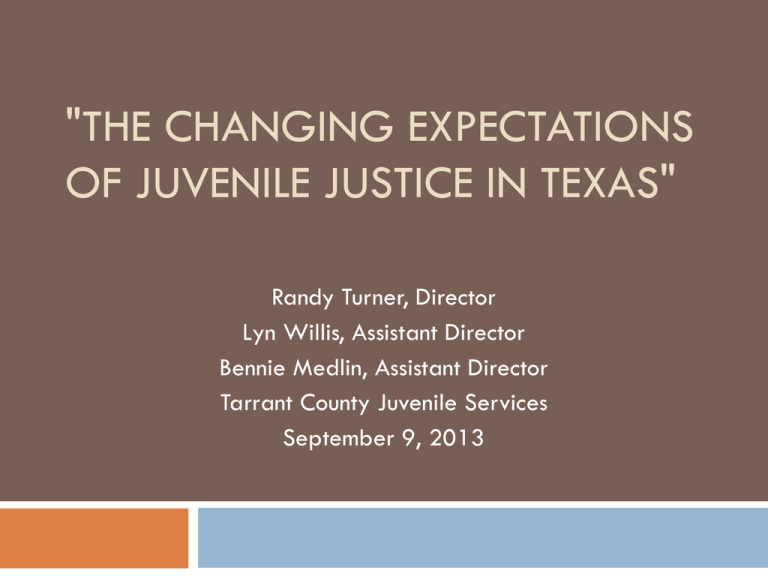
"THE CHANGING EXPECTATIONS OF JUVENILE JUSTICE IN TEXAS" Randy Turner, Director Lyn Willis, Assistant Director Bennie Medlin, Assistant Director Tarrant County Juvenile Services September 9, 2013 Changes in the Texas Juvenile Justice System 2007: Public disclosure of abuses by staff in the state juvenile facilities operated by the Texas Youth Commission (TYC) Law changed to no longer allow youth convicted of misdemeanant offenses to be committed to TYC Began to see an out-cry to reduce the number of youth in TYC secure programs (approx 5,000) with emphasis on community-based interventions Legislature began to provide additional funding for local juvenile probation departments through the Texas Juvenile Probation Commission (TJPC) Changes in the Texas Juvenile Justice System 2009-2011: Significant issues continued at the TYC State-operated secure juvenile facilities Continuing emphasis for the State to provide funding to the local juvenile probation departments to support communitybased services through TJPC Legislative action to combine TYC and TJPC into one juvenile justice agency began in 2009, and culminated in 2011 with the creation of the Texas Juvenile Justice Department (TJJD) On-going decline in referrals to both the local juvenile departments and the State Changes in the Texas Juvenile Justice System What is going on NOW? Major reduction in the number of youth being committed to the State’s custody; each county is provided with a “target” TJJD has reduced state-operated facilities from 14 to 5 since 2007; population has been reduced from 5,000 to 1,200 Continued emphasis on providing $$$ to local probation departments to better serve youth within the community through family-, community-, and evidence-based services Tarrant County Juvenile Services Tarrant County Juvenile Services Tarrant County Juvenile Services Tarrant County Juvenile Services Tarrant County Juvenile Services Tarrant County Juvenile Services Unlike many other probation agencies across the State and nation, TCJS has historically had a philosophy to work with youth within the context of community and family engagement, with support of and in collaboration with other key stakeholders Continuing current collaborations and creating opportunities for new partnerships will be critical components of our future strategic work Through research and program evaluation, we will learn more effective application of these core principles and values Tarrant County Juvenile Services Commitment to Principles of Effective Intervention: Assessment to clearly identify youth and family risk and needs; now required by the State prior to all dispositional hearings Training for all staff in motivational interviewing techniques, supported by national research as an evidence-based technique for juvenile offenders Responsivity principle…develop and implement best and evidencebased practices directly related to impacting identified risk/needs Engaged in work to address Disproportionate Minority Contact, including the MHC work on Cultural and Linguistic Competencies Research and Program Evaluation Tarrant County Juvenile Services New emphasis on Prevention Services Through grant with TJJD, family and school engagement initiative with FWISD/ “INSIGHTS” “Family Engagement Specialist” at the district’s DAEP provides case management services Referral for more intense services with existing District resources & additional contract providers, Support for transition back to the home school and navigation of available resources Crossover Youth Program/”Shared Visions for Success” Collaboration with DFPS/CPS to provide collaborative services for youth with history of CPS involvement upon referral to the juvenile justice system Coordinated assessment, case planning, & case management One Judge hears all cases to provide consistency and reinforcement Tarrant County Juvenile Services Even though overall referrals are down, continue to address an increased need for mental health services Mental Health Related Services Cooperative agreement with Child Welfare and MHMRTC to provide liaisons that have offices in the Juvenile Justice Center to better address needs of youth/families and assist in coordination of services; Conduct mental health assessment upon intake to detention and with all new referrals (MAYSI-2), with designated protocol to respond to identified needs; Two Full-time Psychologists hired since 2004; Contracted psychiatric services, available in detention on weekly basis; Enhanced referral process for emergent MH services as needed; Tarrant County Juvenile Services Collaboration with MHMRTC to provide… (1) Special Needs Diversion Program to provide specific mental health intervention 24/7 for specific youth/families, (2) Expanded MH services for youth/families; Involved in community-wide initiatives to develop and implement Trauma-Informed Care, and a deeper understanding of brain development, esp. within the juvenile offender population; Involvement with the State through the MacArthur Foundation’s Model-for-Change initiative to develop a mental health curriculum for juvenile justice personnel Tarrant County Juvenile Services Questions? THANK YOU!!
